Arnon Grunberg's Blog, page 25
February 5, 2025
Spending
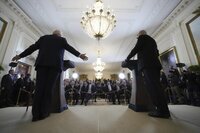 View
ViewOn Monaco – Amir Tibon in Haarez:
‘In his press conference with Prime Minister Benjamin Netanyahu, Trump spoke about the United States taking over Gaza, cleaning the massive amount of rubble created during the war and rebuilding it as a Monaco-style Riviera on the Mediterranean coastline. In his view, this will also require relocating its 2 million people to other countries.’
(…)
‘Even the pro-Trump Fox News channel raised this question on Tuesday after his press conference with Netanyahu. It wondered how an American takeover of Gaza makes sense for an administration that has promised to slash government spending, with the emphasis being on money spent overseas.’
(…)
‘Perhaps his one other option is to ask Musk himself – whose fortune is larger than that of many world governments – to write a modest check for $10 or $20 billion. In the brave new world we now live in, even this outlandish idea shouldn't be ruled out.’
Read the article here.
Gaza might become Muskland or Muskonia.
He might be willing to write a check.
Gaza first, space later. Or the other way around.
February 4, 2025
Shaping
 Accent
AccentOn a maleta – Natalia Sylvester in NYT (April 2024):
‘My earliest relationship with language was defined by rules. As an immigrant who came to this country from Peru at age 4, I spent half of my days in kindergarten occupied with learning the rules of the English language. There was the tricky inconsistency of pronunciation to navigate and, once I learned to speak it, the challenge of translating what I’d learned into reading skills.
At home, my mom would often create games to help my sister and me preserve our Spanish and improve our grammar. Driving around our neighborhood in Miami, she’d point at a traffic light, hold up four fingers and say, “Se-ma-fo-ro — on which syllable do you put the accent?”Each language had its defined space: English in school, Spanish at home. But as my parents became more fluent (and my sister and I more dominant) in English, the boundaries became blurred. Being bilingual empowered us to break barriers beyond the rules and definitions attached to words. Some things were simply untranslatable, because they spoke to this new space we were living in — within, between and around language. We were making a new home here, same as so many immigrants who end up shaping language as much as it shapes us.’
(…)
‘Some ideas are so embedded in Latin American and Spanish cultures that they exist implicitly. Of course “ganas” can be something you feel but also give, and be at once more tame yet more powerful than “desire.” (If you know, you know.)’
(…)
‘Take the Spanish word “maleta,” or “suitcase” in English. This year, I was at a writing conference and met up with two Mexican American authors, one of whom brought her suitcase to the venue because she had already checked out of the hotel. We walked the halls and offered to help with her maleta, making several jokes and references to it, but never once using the word “suitcase,” despite speaking mainly in English.
This was an entirely natural and unspoken decision. There are some words that simply feel truer in Spanish than they do in English.’
(..)
‘A suitcase is for clothes and possessions when someone travels, but to me, a maleta meant family had arrived from Peru, carrying flavors, textures and memories of my birthplace.’
(…)
‘We, in turn, didn’t so much break the rules as we simply played with them, swirling bits of English and Spanish together until it resembled something new yet familiar, our fingerprints proudly planted in its mess.’
Read the article here.
I guess most children of immigrants will know between the often secret and somehow forbidden language spoken or sometimes spoken at home and the official language used in the outside world.
It must be a loss if you never had this experience, at least it’s a setback, you must discover all the ambiguities of language yourself.
One of the more famous examples of this combination is the phrase: ‘I’m happy, but glücklich bin ich nicht.’
February 3, 2025
Wars
 Trade
TradeBecause of the upcoming trade wars or the trade wars that just have been averted I will sell my HP printer (5664) with signature and original poem in an edition of one.
Including dinner in Manhattan.
The buyer, needless to say, will collect the printer himself in Manhattan. Then dinner. Or breakfast. Depending on the buyer.
In times of trade wars, we cannot afford to be picky. (info@arnongrunberg.com)
Revenge
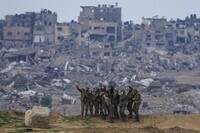 Pages
PagesOn a war diary - Ronen Tal in Haaretz:
‘It's early evening in a destroyed mosque after an Israeli bombing. The floor is littered with plaster from the ceiling, the windows have been blown out, the chairs turned into pieces of wood.
Gazan men, their hands bound behind them, are sitting on the floor in rows, waiting for their turn to be interrogated. An Israeli soldier with a rifle is standing in front of them and tearing pages out of a Quran.
"I approached him and asked him for the meaning of his behavior," Asaf Hazani writes in his Hebrew-language book "One Way or Another the Sword Shall Devour – Anthropology in War: A Field Diary."
"He replied with a sad look, really the saddest look imaginable. 'Me? I'm taking revenge against them.'"
The image of the sad soldier tearing out the pages of the book so sacred to Muslims lingers through Lt. Col. Hazani's work, which is based on the author's war diary. Hazani is an anthropologist who did reserve duty as a staff officer for a combat division in Gaza.
The tearing up of the Quran was a violation of army norms, but Hazani eschews ethical judgments and tries to uncover the unconscious emotional motivation that caused this gratuitous rite of desecration.’
(…)
‘Hazani's book can be found in every branch of Steimatzky and Tzomet Sfarim, Israel's two main bookstore chains. And copies have been sent to journalists, book reviewers and defense researchers. But this is a rare instance where the author of a current-affairs book refuses to go through with the interview that he himself initiated, because his commanders dissented.
This triggers worries about self-censorship. It's hard not to wonder what the senior officers are afraid of. What embarrassing information that Hazani kept out of his book is he likely to blurt out in a newspaper interview? (The IDF Spokesman's Unit said: "Hazani had second thoughts and decided not to be interviewed. As far as we are concerned, there is no reason he should not be interviewed.")’
(…)
‘In another case, two brothers, both lieutenant colonels, arranged to be in the same sector and go on missions together. Hazani writes that this gives new meaning to the term "fighting family" – a historical term for the Israeli right wing.
Hazani doesn't express reservations about family and friends joining the fighting, nor does he claim that it harmed operations. He sees it as another symptom of the atmosphere of general collapse in the army and all Israeli society as a result of Hamas' onslaught. "After October 7, the sense of trust in the system disappeared. Everyone gathers in his own group and takes care of himself," he writes.
"The country fell apart and only families remain. Some are broken and others are regrouping. They're the ones who are fighting back – the families and the groups."’
(…)
‘Another revelation is senior commanders not obeying the security directives they were supposed to enforce on their soldiers. For example, officers took selfies during the fighting, even though they were warned that this would endanger their lives because the enemy could pinpoint their exact location.
Some soldiers and officers received "kosher" phones that let them communicate within the units and with home. In one case, a major had such a phone but talked to his wife on his private iPhone. Hazani ordered him to end the conversation. "While doing so he looked at me angrily and muttered something under his mustache."
The obsessive photo-taking and filming on phones wasn't only done by soldiers not obeying orders; it seems the military itself considered the orders a nonbinding recommendation. Division headquarters asked the commanders to send pictures from the places they had reached.
"Every evening we would collect their pictures and enter them into the military network," Hazani writes, adding that the commanders had military phones for taking pictures along with the GoPro cameras installed on the soldiers' helmets.’
(…)
‘Regarding the transformation of the IDF into a collection of militias, reservists from the 55th Brigade wrote their company commander that they refused to be released to civilian life because not one of the war's goals had been achieved. They wrote: "This order does not conform with the values we were taught: You don't leave anyone behind.
"How can we return to our families before the 136 hostages [at the time] have returned to their families? How can we return before the threat to the residents of the Gaza border communities has been removed? How can we return to our daily routine as if our mission were accomplished, at a time when every mortal in Rafah can still, at the press of a button, send all the children of Ashdod, Rishon Letzion and Tel Aviv to the bomb shelter?"’
(…)
‘Finally, soldiers were told that the retrieving of the bodies of dead Israelis was an ethical mission. "We sent soldiers to collect bodies, and we didn't know if they were hostages and captured soldiers or Gazans," Hazani writes.
He proposes the phrase "living bodies [gufim] to bring back dead bodies [gufot]," adding: "We knew that there was a chance that on the way the bodies of some of them would become dead bodies due to a clash or an explosive device, and we knew that a dead body isn't a dead body until it's identified as such."’
Read the article here.
The breakup of an army into private militias, the erosion of trust in the most important institutions, the lack of clear war aims, the absence of discipline, all signs that the war has ended in defat. Only defeat, no winners.
Living bodies waiting to become dead bodies.
February 1, 2025
Matters
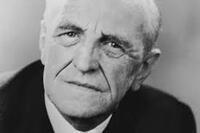 Genius
GeniusOn the biographer and his business – Robert Rodman in LRB (in 2004):
“Some believe the kind of psychoanalysis he developed – a ‘master-plot of human development’, according to Adam Phillips – is incompatible with Freud’s, and it certainly came to differ critically from that of Melanie Klein, from whom he nevertheless learned a great deal. Indeed Phillips says that his work ‘cannot be understood without reference to Klein. It is a continuous, and sometimes inexplicit, commentary on and critique of her work. The importance of the internal world and its objects, the elaborate and pervasive power of fantasy, the central notion of primitive greed – all these ideas Winnicott takes over from Klein and uses them in his own way.’ But in the end the institutional rigidity of Klein’s system repelled him. As between people enslaved to a doctrine and a method, and people who work things out on their own, Winnicott strongly preferred the latter, and thought the practices of the former likely to inhibit rather than encourage personal development. Like many another genius, he knew how to find – or, as he put it, ‘steal’ – and use what he needed.”
(…)
“The first marriage, which lasted for years, was sexless, either because Winnicott was impotent or because his first wife was averse from sex; or perhaps both. The second, though not restricted in this way, remained childless. These are private matters, but cannot fail to interest a biographer, least of all a biographer as industrious and astute and professionally alert as the generally sympathetic Rodman. So keen is his scent, so candid his interpretations, that it seems odd to find him turning away from consideration of an affair Clare Winnicott may have had when Winnicott felt he had to wait for his father’s death before he could marry her. ‘It is none of our business, anyway,’ Rodman says. Coming from a biographer who sees practically everything else as his business, this is a strange disclaimer.”
(…)
“Winnicott himself attached importance to the fact that his father had so disliked the quasi-sexual excitement experienced by his wife when breast-feeding baby Winnicott that he made her give up the practice. The analyst Marion Milner was one of those who thought that this prohibition had a lifelong effect on the child, in particular during his long struggle to persuade Klein that mothers really matter (objectively, constituting a ‘holding environment’). This effort ‘was the adult equivalent’ of the baby’s ‘struggle to get milk out of his own mother’. His father’s attitude perhaps also contributed to the most celebrated lacuna in Winnicott’s work: until very late in his life he assigned no role whatever to fathers. Rodman naturally has much to say about this partial blindness, or, in a piece of jargon he borrows from Winnicott, this scotoma.”
(…)
“t seems right that the general idea of him is of a doctor who had an extraordinary gift in dealing with children. His account of the mother-child relationship is not as stark as Klein’s, but it stresses the emotion of the mother – he sometimes defines it as hatred and regards it as a feature not only of the mother’s attitude but also of the analyst’s in the counter-transference. It is one of the inevitable difficulties that occur in the process of development. On a superficial view one wouldn’t expect him to confess so readily to the experience of hatred, but despite his gentleness he admitted to having a strong aggressive streak. Rodman quotes some pretty aggressive letters, sometimes addressed to embattled Kleinians, for which he often apologised later. Aggression was part of the psychic given and coexisted with gentleness. It seems he would sometimes physically hold a patient during a session, a practice deplored by colleagues as very bad ‘technique’; his use of it illustrates what he took to be the critical importance of ‘holding’ but also the independence of his thought and practice.”
(…)
“The point here is that in spite of his whimsies and oddities Winnicott’s principal thinking belonged to a world ordinary people could recognise without going into such matters as the Oedipus Complex, or Kleinian bad breasts. Sometimes he is oracular: ‘without the initial good enough environmental provision, the self that can afford to die never develops.’ This is what Rodman calls a ‘typical startling Winnicottian extension of thinking into uncharted territory’. But he uses fairly ordinary language, and though often he makes it sound a bit peculiar it also connects with existential and ethical notions with which the laity can claim some first-hand acquaintance.
He was quite like everybody else, except that he made of himself an environment in which a patient might at last be able ‘to take the risks involved in starting to experience living’. It is also evident that he was capable of extraordinary dedication, and in spite of a long succession of coronaries exhausted himself in his care for patients, especially the regressive and the suicidal.”
Read the article here.
A strange disclaimer, indeed. What’s the biographer’s business exactly, if not also the sex life of his subject?
And Winnicott forgot the father, but that’s fine. He needs to be forgotten.
Aggression of course is part of the ambivalence of love. Especiallly between parents and children.
The self that can afford to die is a bit whimsical, maybe more than bait, but the transitional objects give the laity enough to work with.
The objects are animated. Our fantasies are as strong as reality, often stronger.
Day job
 Walk-up
Walk-upOn real estate and meaning - Rukmini Callimachi in NYT (December 2024):
‘Ken Burns has slept in the same bedroom for the past 45 years.
While numerous additions have been made to the original house, he proudly points out that the bedroom, where his first and second daughters were born 42 and 38 years ago, hasn’t changed. (Immediately, he corrects himself to mention that the mattress has changed.)
The white colonial and a barn are flanked by an apple orchard in the electric green hills of New Hampshire in a town called Walpole.
It’s this house and this piece of land that gave him the financial freedom to make the films of his choosing.
He moved here out of necessity: In 1979, Mr. Burns’s landlord raised the rent on his fifth-floor, walk-up apartment in Manhattan from $275 to $325 — a sum now so quaint that it’s hard to imagine how consequential it was for the beginning filmmaker. The increase meant that he would need to get a day job, and he had a vision of himself decades later, returning haggard from the office, the reels of his unfinished documentary atop the refrigerator.’
(…)
‘Ken was 11 and his brother, Ric, was 10, when their mother was on her deathbed. Their father, Robert Kyle Burns Jr., an anthropologist, was mentally ill.
As his mother’s cancer metastasized, Ken overheard conversations — his mother pleading with relatives, asking for someone, anyone, to take her boys in the event of her death. “I remember being scared — scared all the time,” he said.
With their mother in the hospital, the boys were left to wait at home for the inevitable. On the night of April 28, 1965, Ken went to bed with one of the worst stomachaches he had ever had — his body registering what none of the adults would speak about.
The pain disappeared suddenly. The phone rang. His mother was gone.
On a cul-de-sac, the Burns family — once four, now three — sank into the darkness of Robert’s mind. He bought a fish tank. Then he bought another, and another, until their dining room was lined with 13 tanks teeming with tropical fish, said Ric Burns, now 69, who is also a filmmaker.’
(…)
‘After his first marriage imploded, when he was in his late 30s, Mr. Burns decided to turn his skills to the hole inside his own family. He realized he didn’t even know where his mother was buried. He and his brother returned to Michigan, where they discovered that their father had failed to pick up their mother’s ashes. Her remains had been sent to a cemetery where she had been buried in a pauper’s grave.’
(…)
‘His focus is on what his associates believe will be his biggest contribution both to documentary film and to America’s sense of itself: A 12-hour epic about the American Revolution, which will be released next year.
It’s what he is working on now in the barn, after returning from his morning walk.’
Read the article here.
Walpole. In the summer of 2023 I spent some time in nearby Putney VT and I remember vividly driving to nearby Walpole with my son and girlfriend to eat at a delightful French restaurant.
Little did I know that Walpole was the town where the dead being raised.
If you want to get things done, go your barn after your morning walk.
To escape death you can be on the move all the time, or you can stay put.
January 30, 2025
Participants
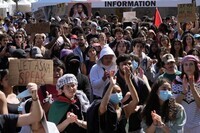 Aliens
AliensOn ‘we will find you, and we will deport you’ - Etan Nechin in Haaretz:
‘In the former USSR, as it was flailing into the 1980's, General Secretary of the Communist Party Yuri Andropov aimed to revive a practice from the Stalinist era: the informer. Police and volunteer militias encouraged citizens to flag neighbors to be punished for "antisocial" behaviors and dissidence.
President Donald Trump's executive order on antisemitism, which includes provisions to deport pro-Palestinian protesters, operates on the same dangerous premise. Before the order was officially signed, the administration published this 'explanatory' fact sheet: "To all the resident aliens who joined in the pro-jihadist protests, we put you on notice: come 2025, we will find you, and we will deport you."’
(…)
‘Right-wing groups have already been leveraging AI to identify and target students they claim support Hamas, encouraging complaints to university administrators. These campaigns involve analyzing protest footage, cross-referencing faces with online profiles, and compiling detailed dossiers on foreign students and faculty. Messages circulating in Jewish and Israeli WhatsApp groups ask participants to report those perceived as "supporters of Hamas," often with minimal evidence.’
(…)
‘Like Andropov, Trump understands the limits of external force. The real power of authoritarianism lies in subverting norms, so a society turns against itself – where even whispered criticism in private bedrooms or the slightest suspicion of disloyalty becomes justification for betrayal.
It is undeniable that antisemitic incidents in America have risen since October 7, as have campus voices that legitimize the extreme violence of October 7. The failure of university administrators to contain the worst excesses of campus protesters is damning. Even more disturbing is that some faculty membersexpressed publicly how "exhilarated" they felt by Hamas' murder of families in kibbutzim.
However, the criticism of campus protests from the right has gone much further. The Republican Party has blurred the line between legitimate criticism of Israel, Zionism as a nationalist ideology, and Israel's actions in Gaza – labeling all as "anti-Israel" or antisemitic. Moreover, Jews who voice harsh criticism of Israel are often dismissed as self-hating, and Muslims face demands to denounce Hamas before expressing any opinion.’
(…)
‘Just before President Trump signed the executive order on antisemitism, a leaked memo revealed that the administration intended to suspend observance of International Holocaust Remembrance Day.
When Elon Musk ironically tweeted, "Apparently, I'm a Zionist AND a Nazi" he inadvertently pointed to a troubling reality: the far right in the West today aligns itself with Israel's current government, and it prioritizes its war on Muslim migrants over its historic, lethal preoccupation with Jews.
This alignment doesn't mean the far right's antisemitic core has vanished – it remains deeply embedded.’
(…)
‘This issue goes beyond pro-Israel or pro-Palestinian advocacy – it's as much about due process as it is about free speech. When language around "supporting terror" is deliberately vague, it opens the floodgates for intimidation, suppression and prosecution, along with a clear message to those to foreign citizens and minority Americans to stay in their lane.’
(…)
‘A society begins to unravel when it turns against itself, seeing neighbors, classmates, and even relatives as threats. This erosion of trust is the first step toward collapse. And when democratic practices are suspended in a moment of moral panic, history warns us not to expect their effortless restoration.’
Read the article here.
An important piece – moral panic s the justification for destroying society.
The all to frivolous use of anti-Semitism as an attempt to punish and intimidate the Muslim minority.
It cannot be repeated often enough: for most on the extreme-right the Jew- and Israel-love is merely a means to an end.
When they are done with the Muslims they will turn against the Jews once again.
Yes, the campus protests have been ugly sometimes, and apparently Hezbollah claimed that they organized some of the protests, but that’s all not the point.
The destruction of civil society is the goal. The obsession with Jews and Israel is a symptom of the feverish energy with which some of the foot soldiers of the new world order have engaged in their campaign against the open society.
January 29, 2025
Base
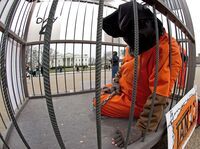 Laken Riley
Laken RileyOn Gitmo – CNN:
‘President Donald Trump on Wednesday said he will sign an executive action ordering the federal government to prepare the US Naval base at Guantanamo Bay, Cuba, to house tens of thousands of migrants.
“Today, I’m also signing an executive order to instruct the Departments of Defense and Homeland Security to begin preparing the 30,000-person migrant facility at Guantanamo Bay,” Trump said from the White House.
“Most people don’t even know about it. We have 30,000 beds in Guantanamo to detain the worst criminal illegal aliens threatening the American people. This will double our capacity immediately.”Trump’s remarks came just before he signed the Laken Riley Act, the first major legislative win of his second term, which requires the detention of undocumented migrants charged with certain crimes. Congress passed it earlier this month with Democratic support.’
(…)
‘While the base is well-known for its detention camp where the United States holds terrorism suspects, Guantanamo Bay also hosts a separate migrant-processing center.
The Biden administration had discussed using that center to process Haitian migrants who were fleeing worsening conditions in their country last year. The US military also prepared the site to host migrants fleeing the catastrophic 2010 earthquake in Haiti.
The facilities at Guantanamo Bay are far from prepared to house up to 30,000 migrants, a US official told CNN.
“There’s no way there’s 30,000 beds anymore,” the US official said, adding that the capacity existed in the 1990s but no longer. And in order to care for that number of people, the official said, the US would have to bring “a lot of military staff” in.
“If they sent a lot of migrants (to Guantanamo Bay), they would need a lot more staff to manage them,” the official added. “They couldn’t do it with what they’ve got now, no way.”’
Read the article here.
From disgrace to more disgrace.
The main reason that Gitmo still exists is that the terrorism suspects who are there might reveal torture and other inhuman i.e. illegal methods the US used against them in the aftermath of 9/11. That’s why there is no process.
What would an empire, what would a nation state be without terrorists?If the terrorists are gone just name asylum seekers terrorists. And then continue or intensify the war against asylum seekers.
January 28, 2025
Rescue
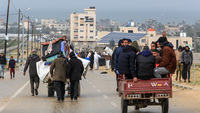 Countries
CountriesOn other disruptions – Zvi Bar'el in Haaretz:
‘Jordan would never become "an alternative homeland" for Palestinians, King Abdullah declared in a speech at the UN General Assembly last September. At the time, the king had to deal with threats from the Israeli far-right; this week, he was startled to hear from President Trump that Jordan's becoming a Palestinian homeland could become official White House policy.
The king himself has yet to publicly react, and it is unclear what Trump said, exactly, but Trump's "humane" suggestion has already caused a tremendous public outcry, and it now seems as if Jordan and Egypt intend to recruit Saudi Arabia and other Arab countries considered U.S. allies in order to get Trump to climb down that tree.’(…)
‘Jordanian anxiety has done its part, and former Secretary of State Antony Blinken made it publicly clear last January that "Palestinian civilians must be able to return home as soon as conditions allow. They cannot, they must not be pressed to leave Gaza," adding that he has assurances from Prime Minister Netanyahu that it was not Israel's policy to encourage voluntary migration from Gaza.’
(…)
‘After Trump last week put a freeze on all U.S. government foreign aid to all the world's countries, with the exception of Israel and Egypt, it is unclear what is to become of that agreement, intended to rescue Jordan from a deep recession, with a budget deficit of some $2.2 billion and unemployment at over 21 percent. Jordan is now required to tiptoe in order to preserve the financial aid and the tariff benefits it gets from the U.S.; however, any influx of refugees into its territory would mean unbearable financial burden.
Already, the cost of Jordan's "hosting" of refugees is estimated at some $2 billion per year, with aid received for them shrinking. The kingdom has recently decided to levy a fee on work permits given to Gaza residents who are not Jordanian nationals, as it previously cancelled the exemption given to other refugees from this expensive fee, at $500 per year. Here lies the other threat posed by the notion of the transfer of Palestinians into Jordan. The absorption of refugees from Syria and Iraq has not only incurred excessive spending on civilian infrastructure such as water, electricity, health and education, but has also caused thousands of Jordanian citizens to lose their jobs, having been replaced by cheap refugee labor.’
(…)
‘But Trump's vision of a transfer is not just a Jordanian or Egyptian problem. It could influence relations between all Arab countries and the U.S. and put to the supreme test the ability of Arab regimes, including those considered strategic allies of the U.S., to face public pressures that this plan could stir. The dream of normalization between Israel and Saudi Arabia could then be just collateral damage of Trump's real-estate enterprise in Gaza.’
Read the article here.
He might eye the Nobel Peace Prize, but setting the Middle East on fire appears to be attractive as well.
Of course, he might climb down that tree.
Or nor.
The international order is crumbling and Trump would like to fasten the downfall of all that was. Of what will come next is going to be an improvement is doubtful.
A bit of decline in the name of progress, or maybe more than a bit, is how shall I put it, very traditional.
January 27, 2025
Side
 Narrative
NarrativeOn rapprochement - Martin Pfaffenzeller in Der Spiegel:
‘Tauno Aarni had only been in Sweden for a couple of weeks before he started talking. From Finland, Aarni had found shelter in a refugee camp in the Swedish port city of Gävle because he, as an anti-communist, allegedly faced persecution back home.
In late November 1944, Aarni spoke with a police officer who he thought shared his views on Judaism. Jews, he told the police officer, cannot be seen as humans. He continued with a sentence that would prove problematic for him: "If you only knew how many Jews I have shot.”’
(…)
‘According to the commonly accepted narrative, the Finnish SS members had nothing to do with war crimes and the Holocaust – or, if they did, they were forced to participate against their will.’
(…)
‘Helsinki, however, didn’t believe that the harmony between Hitler and Stalin would last very long. The government believed it would have to choose one side or the other so as not to be trapped between the two great powers. The country chose Nazi Germany.
Finland began negotiating with Germany in August 1940 over arms deliveries. In return, the Germans would receive permission to attack the Soviet Union from Finnish territory. Soon, Finnish units also began cropping up in German war plans. The volunteer SS battalion was to be a symbol of rapprochement.’
(…)
‘On June 22, 1941, Hitler broke the non-aggression pact with Stalin and attacked the Soviet Union. Alongside the Germans, troops from Finland, Denmark, the Netherlands and Norway also fought in the SS Wiking Division. All of them had sworn an oath to the "Führer.”The division, 19,000-strong initially, moved through Ukraine to the southeast. The motto, as the troops well knew, was: "The SS takes no prisoners.” Red Army soldiers who surrendered were frequently shot on the spot. The division was similarly merciless with the Jewish population. In the town of Zboriv, they are thought to have participated in the slaughter of 600 Jews that July. They also provided occasional support to the Einsatzgruppen, the special task forces that systematically murdered Jews, Roma and communists.’
(…)
‘Finland also soon lost interest in the former SS members. The country had defended its independence, though it aligned its foreign policy with that of the Soviet Union, and it was eager to avoid angering Moscow by admitting to having participated in the German war of extermination, which is thought to have cost the lives of 25 million Soviet citizens.’
(…)
‘The historian expects that he will again be vilified for his paper once it is published in the spring. He says that the societal climate in Finland had deteriorated. The Finns Party, which has been back in government since 2023 and is strictly anti-Russian due to the country’s history, is trying to assert its revisionist view of history, Swanström claims. Recently, three government ministers from the party supported a motion to provide the SS veterans association with funding to conduct a counter-study.
On top of that, Swanström believes that the Russian invasion of Ukraine has reinforced conservative views of history. "Currently, old narratives of heroes and enemies are coming to the fore. The Russians are evil and their opponents are automatically good.” Swanström, though, also sees his work as a contribution to the defense of freedom. "We should not become a mirror image of the Russians, who reject any critical examination of their history.”’
Read the article here.
The urge to reject any critical examination of the history is just the flipside of the coin: the urge to see the own history as nothing but one big crime.
Which doesn’t imply that both sides are equally wrong.
The need to whitewash is always more dangerous.
Most people are good at adapting (mental health). They will do what they need to do to survive. Sometimes to do a bit more than sheer surviving, and they become willing executioners.
Arnon Grunberg's Blog
- Arnon Grunberg's profile
- 415 followers



